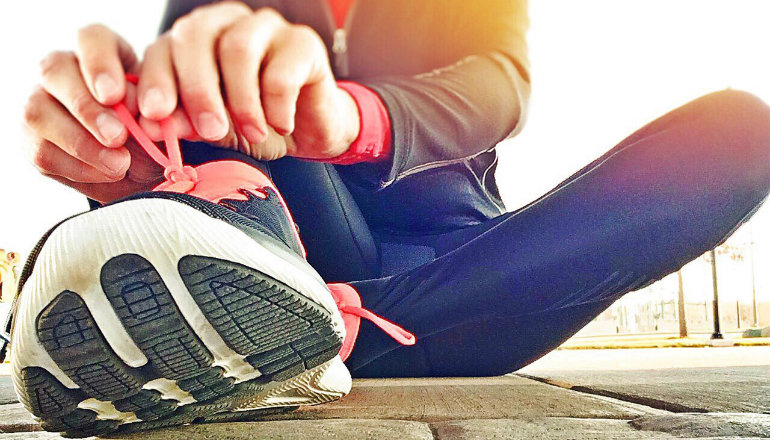 Reading Time: 9 minutes
Reading Time: 9 minutesThe journey to changing body composition can be rapid (and you can do it quickly).
Here’s the formula:
- Cut (way) down on your intake of processed sugars and high-glycemic index foods.
- Increase your intake of protein and high-quality fats.
- Eat lots of vegetables.
- Make water your primary beverage.
- Ramp up the volume (and frequency) of your fitness training.
- Incorporate focused recovery into your training, including mobility and low-intensity aerobic work.
- Sleep seven to eight hours a night.
- Reduce your stress to a minimum.
- Do these things immediately and perfectly.
Of course, this sounds a lot like the Whole Life Challenge — except for the last bit.
Because we’re not asking you to do these things perfectly. Or immediately. Rather, we want you to develop these habits one at a time. We want you to begin with a focused effort — and then we want you to extend the lessons learned over the rest of your life.
(Hear that last point one more time.)
This isn’t about your score today.
Or tomorrow.
Or for the duration of the Challenge.
It’s about your score over a lifetime:
- How many days of your life can you eat well?
- Exercise?
- Say no to the junk food on our collective shelves and pantries?
- Choose water over beer?
- Express gratitude, call on your friends, or meditate your way through a stressful situation?
- Make the 7 Habits your default lifestyle?
As soon as you move to this way of thinking, understanding that the Challenge is about building a lifetime of good habits, you’ll realize that we believe the slow, steady accumulation of good habits will do way more for your body composition than a rapid, extreme lifestyle change.
To illustrate, consider the opposite:
This is your first Challenge (and you’re out to nail it). You select the Performance nutrition level, and you get perfect scores each day across all 7 Habits. No sugar, no junk, no lack of sleep. You train often and hard, and you mobilize and hydrate. And you drop body fat like crazy.
And then what?
The week after the Challenge rolls around, and you’re exhausted. You’ve changed nearly everything about your life (and it feels like a full-time job).
Nothing is a habit.
It all takes effort, thinking, and planning.
It consumes a ton of energy.
So you reject it (and you go back to whatever it is you did before the Whole Life Challenge).
And so the body fat comes back, and you stay away from the next Challenge, deciding that it’s all too much, it’s just too hard, and life is better with a little bit of poor decision making (and some extra padding).
Let me save you from that fate.
The “Magic” of Consistency
We’ll begin by thinking of the Challenge (and diet and training in general) in a different light, embracing a philosophy of consistency. As applied here, “consistency” is the idea that whenever you make a change toward a healthy lifestyle, you’ll do so with the aim of creating a habit that endures for the long term.
You’ll take small steps, with no goal other than repeating your behavior again and again.
This is the true path to health — and it’s the point of the Whole Life Challenge. We’re developing repeatable behaviors rather than flash-in-the-pan change. We set a long-term focus toward our goals, couched in consistency.
Pursued for long enough, this will lead to your desired body composition goals.
Note for veterans of the Challenge: You may find you’re already well on your way to incorporating nutrition, exercise, hydration, mobility, sleep, reflection, and the lifestyle practices into your everyday life. If this is the case, consider how you might use the steps below to pursue any of the 7 Habits with more consistency (especially during out-of-Challenge periods). Is there one area where you might do better? A time period when you tend to slip? Could the steps below help you dial in a bit more?
Step 1: Small Steps, Small Wins
Rather than attempt to achieve a perfect score every day across all 7 Habits, start by focusing on a single habit. Paring down the scope of the Challenge to a single habit (or two) will allow you to stack up wins, boosting your confidence and giving you the necessary repetition to build a lifelong habit.
For instance, you might decide you’re primarily concerned with nutrition (a good focus for body composition change), and you’re going to dial in your diet in a manner that’s repeatable throughout (and after) the Challenge.
First, you’ll focus on the small win: a perfect score for a single day.
You’ll do your food prep, review your nutrition list, and make sure you don’t slip on nutrition for 24 hours — and you won’t worry about the other Habits. Your only target is a “five” for nutrition (and if the other Habits happen, they happen, but you won’t concern yourself with them today).
The next step: a perfect nutrition score for a second day. Your sole focus remains on your diet.
Once you’ve achieved three days of perfection, you might set your sights a bit higher, aiming for a week of fives. On day eight, cut yourself some slack, use an Indulgence Token, and relax a bit. On day nine, resume your singular focus on achieving your perfect nutrition day. By day thirty, you might decide your goal can be reduced to achieving fours or higher every day, with your focus shifting from perfection to the maintenance of the “good nutrition” habit.
By focusing on a single habit, you’ll avoid becoming overwhelmed by the scope of the Challenge. You’ll stack up small wins, accumulating the building blocks that lead to a lifetime of health. Eventually, you’ll be near automatic with that first habit, and you’ll be able to add additional ones in the same manner — through repetition and focus.
Step 2: Routine Is Your Friend
Habits are automatic. They’re things we do with a minimum of conscious thought, and by definition, they occur regularly. If you want to succeed in forming them (and especially if you want them to last once your willpower fades), you’ll want to give them a recurring slot in your schedule.
For instance, you may be focused on good nutrition. Incorporating a grocery store visit and a food prep session into your schedule every Sunday afternoon will ensure you have the right foods on hand throughout the coming week — helping you avoid the temptations that occur when you’re unprepared and forced to eat whatever is available.
If you’re working on an exercise habit, you may decide you’ll exercise first thing in the morning, every morning, getting in your ten minutes of activity. No matter what the day or your obligations, when your feet hit the ground, you’re on your way to exercise.
This may be the most underrated factor in building good health habits (and by extension, achieving your desired body composition) — giving your habits a dedicated slot in your life will ensure they won’t be waylaid by lack of time or motivation.
Simply, they occur each day when they’re supposed to, no additional drive required.
Step 3: Understand the Scoreboard
You record your score each day during the Whole Life Challenge — 7 Habits, worth 5 points each. What’s more, your score accumulates throughout the Challenge, the total of your daily performances. By comparing that total against the other players on your team, you’re ranked on the team leaderboard. Taking it one step further, we add up the total score across all the players on your team, resulting in a team score displayed on the worldwide leaderboard, showing where you stand against thousands of other teams.
Given all this scoring, you’d be forgiven for putting a lot of weight (and mental energy) into your own score.
Before you do, realize it exists for only one purpose — to give you motivation. You may get that motivation by comparing your score to others, by pursuing perfection, or simply by watching your own progress over time. If you’re the type who appreciates competition (like me) and is spurred to build good habits though comparison, by all means go for first place. If you prefer to monitor your own progress, seeing how you’re improving over time, feel free to ignore the team and worldwide leaderboards completely.
Once you’ve processed this idea, simultaneously understanding that there is no prize money (and extremely fleeting glory) in achieving a perfect score, you’ll understand the scoreboard is only there to help, a tool to be used as you see fit.
More importantly, understand that a bad score is not a measure of your worth as a human being. Rather, it is an indication that the habits you’re building take time to build, and your journey is not yet complete.
Step 4: Abandon Perfection
Maintaining a habit for a lifetime (whether nutrition, exercise, mobility, or something else) requires moderation rather than perfection.
This means your goal should be one of consistency rather than intensity — eating well most of the time (rather than perfectly some of the time), exercising most days (rather than every day). You may slip occasionally, a beer at the ballgame, ice cream on your birthday, a lazy Sunday on the couch, but your overriding goal is to make each of the 7 Habits an ingrained part of your life.
You cannot do this if you expect perfection. Perfection implies that anything short of the ideal is defeat, an idea that becomes a huge mental obstacle to carrying on with “good enough.”
With health, you are aiming only for good habits, most of the time.
You should carry this idea to achieving your desired body composition, as well. You will likely never be quite as carved as you’d like, never completely content with the way you look in the mirror. Rather than view bodily imperfection as failure, chalk it up to human nature — we always want a little bit more than we’ve got (and we’re singularly bad at understanding when we’ve made extraordinary progress).
Step 5: Remember the Name
You didn’t sign up for “The X-Number-of-Days Challenge.” You signed up for the Whole Life Challenge — and the name is intentional.
As it implies, we’re aimed at a lifetime of good habits (rather than a month and a half of flash-in-the-pan progress). We’re aimed at a lifestyle change that is effective, lasting, and life-altering.
This means you should aim to build habits as slowly as is necessary to make them a true part of your life. If you maintain this perspective, you’ll pursue the Challenge the right way, and the formula for improved body composition (along with reduced stress, improved well-being, and a kinder, calmer demeanor) will be yours.
The key points:
- Body composition change requires you to take on a host of new behaviors, including improved nutrition, increased exercise, reduced stress, improved sleep, and a focus on stretching and hydration.
- Pursuing all of these behaviors simultaneously for the duration of the Challenge will almost certainly change your body — but you’ll likely revert to your old form if you don’t make each of them a habit.
- Habits are built slowly, through consistency.
- Taking small steps, establishing a routine, using the scoreboard for your own purposes, and abandoning the expectation of perfection are all critical to building consistency.
- The Whole Life Challenge is a tool for building habits, and should be approached as such. We’re aimed at a lifestyle change that lasts for the rest of your life.











